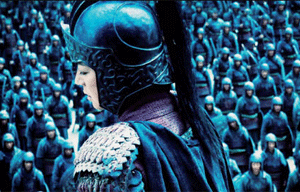Being in Beidaihe eased all the stress of getting there
Updated: 2011-09-22 07:58
By John Clark (China Daily)
|
|||||||||
The man swimming towards me had a jellyfish balanced on his left hand.
He held it toward me as if he was offering a slice of cake.
I'm not keen on jellyfish. Not since I was stung by one while swimming in Greece.
 |
It was like having scalding water thrown on my back. White weals covered my shoulder for a week.
I had my revenge though. I ate one of my attackers' relatives (deep fried) in a Chinese restaurant in Glasgow.
I gave jellyfish man the thumbs-up to indicate that I thought he had a magnificent specimen. Was it dead or alive? Who knows?
I swam away quickly and was floating on my back when he approached again. It crossed my mind that he might be stalking me, armed with a cnidarian (a creature with stinging cells). Paranoia takes strange forms.
Jellyfish man went ashore with his trophy. Our encounter took place in the Bohai Sea off Beidaihe in Hebei province. The sea swimming was wonderful: warm and cool currents; safe bathing areas. The seafood was delicious: prawns, oysters, crab.
After a soothing day at the seaside my wife and I were almost on speaking terms.
I should explain. Our journey to Beidaihe had not gone smoothly.
I was the one who said we didn't need to book train tickets or a hotel room. A trip to the seaside? It would be a dawdle (Scottish expression meaning easy).
We waited in a queue at Gate 16 (for foreigners) at Beijing Railway Station for 40 minutes.
We'd almost reached the head of the queue when the woman in the ticket booth put up a sign in Chinese and disappeared.
It was about noon. I guessed the sign read, "Gone for lunch".
A uniformed official said we should follow him.
We joined the queue at Gate 1. When it was our turn the ticket seller, who spoke no English, indicated that we should go back to Gate 16.
We wandered into the adjoining ticket hall hoping to spot the destination Beidaihe in English, on an electronic board. No luck. A student who spoke English suggested we could buy tickets at a gate nearby.
We queued and when it was our turn our request was met with blank looks and shakes of the head.
Beijing Railway Station is a vast building. Security is tight; X-ray machines, station staff with metal detectors. They don't sell train tickets in the main concourse. To reach the ticket hall you have to go back outside and walk 200 meters west. We didn't know this. We went through security so many times that day the staff seemed like friends.
We spent a fruitless 90 minutes trying to buy tickets. Time for lunch, time to plan a strategy. We would go to the stationmaster, phone a Chinese friend and ask her to request our tickets.
This worked a treat. Only problem was our train didn't leave for another three-and-a-half hours.
We checked our bags into left luggage and killed time, hardly speaking.
The train journey was swift but it was after 8 pm when we arrived at Beidaihe's spanking new railway station.
I bought a map but it was in Chinese and Russian. I showed a taxi driver we wanted to find a hotel at the seaside. He indicated it would cost 50 yuan ($7.84). I said no. We haggled. A small crowd grew. We agreed on 30 yuan.
There were no rooms available in any of the seaside hotels. Our taxi driver obligingly drove us what seemed like 16 km to another hotel which charged us 500 yuan for a double room.
By now it was 9.30 pm and we hadn't eaten. Another taxi took us to a beachside restaurant where we were charged 100 yuan for a plate of dumplings and two beers. By this time we didn't care.
Things could only get better. And they did.












